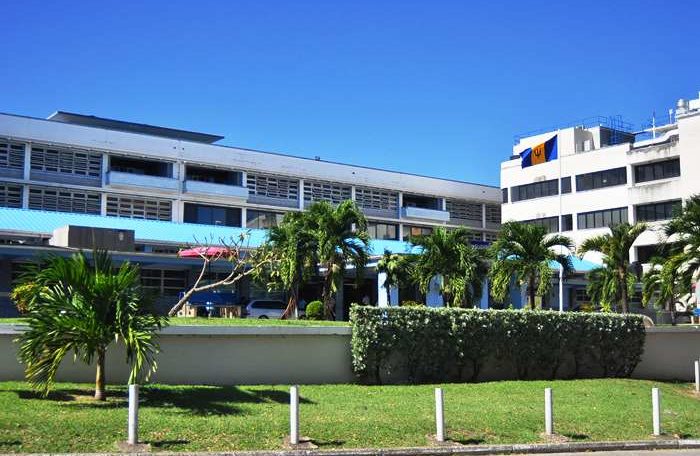By Ryan Gilkes
There are simply not enough places for young doctors to intern at the Queen Elizabeth Hospital (QEH), the hospital’s internship coordinator said Friday.
Even more challenging for medical officials, paid placement for speciality registrar jobs is also proving to be a headache, said Dr Clyde Cave.
Speaking at the QEH’s internship awards ceremony which recognised five young doctors, Dr Cave told reporters that there are only 36 positions available at the QEH. The posts are filled by students from the University of the West Indies Cave Hill campus, other local universities and medical schools, and regional and international schools.
Speciality and subspecialty training was also a problem as there were no available positions in the departments across the QEH, he added.
“It’s always challenging. Sometimes that means we have to turn down very good candidates from other islands in the region which, obviously, is a distressing thing to have to do . . . if we have to select based on things other than quality,” the consultant told the media, adding that it was not a simple task to increase the numbers in the programme.
“We are accredited for a maximum of 36 interns. Their job depends on the number of patients they have to learn on, the number of consultants they have to mentor them, the number of hours and also the budget that we have to pay for them. And the hospital – one of this size – we’re not going to be able to go much beyond 36. It would seem easy; just create more internships, dilute the whole product, but then you get diluted doctors and we’re still aiming for quality practitioners at the end of the internship . . . not just to get them through the bureaucracy.”
Despite this, Dr Cave has been quick to defend the programme, noting that there was a delicate balance in selecting interns.
He said: “I think it’s a little bit unfair for us as a teaching hospital of the University of the West Indies to teach people undergraduate clinical sciences, teach them clinical sciences here in their own country, and then say, ‘sorry, we are going to take somebody from another university who has gone through the same kind of training’. But to balance that, you want to take the best possible candidates who apply, regardless of where they come from.
“With a limited number of interns, it’s always going to be a challenge. So I don’t think you put all your eggs in the same basket from the very beginning of your medical career. Don’t assume that you will get in, don’t assume you will pass. Don’t assume somebody will give you an internship where you want it, when you want it, or that there will be a job for you when you have completed your training. Because we’re at a point now where after the internship, the speciality registrar jobs, which is where they do their speciality training or subspecialty training, those are limited too. So we have doctors who want to become surgeons and there are no available positions in the departments.”
The bottleneck in speciality registrar roles has also raised concerns, Dr Cave noted, especially in departments like surgery where job availability doesn’t necessarily align with the number of qualified applicants.
He argued for a focus on training better doctors rather than a simple increase in numbers.
“What we may need is more efficient, better-trained doctors who have a different kind of work ethic to some of the people who we might find in the workforce, who are not giving the 24/7 kind of commitment that we used to expect,” the consultant said.
“And maybe the argument is that that is an unrealistic expectation at this time. We don’t ask other professions to do it. We put limits on pilots and other people who have responsibilities, that they cannot work beyond a certain number of hours in a week because it affects performance. These are all factors that the medical profession, particularly at the internship and resident training level, [is] grappling with.”(RG)




